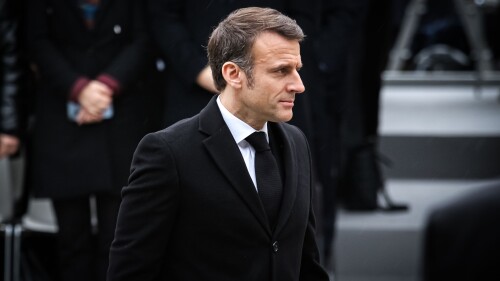About 100 members of the French National Assembly are in shock, having watched yesterday a 43 minutes film provided by the Israel Defense Forces: a succession of videos about the atrocities in South-West Israel, many of them triumphantly released by Hamas itself. While most people in the audience belonged to the France-Israel Friendship Caucus, some did not. Several burst in tears in the middle of the projection and had to leave hastily.
A Macronist member of parliament, Mathieu Lefèvre, explained to the press afterwards why, as the chairman of the France-Israel Caucus, he organized the screening: “These images are unbearable. Until you see them, you may have a theoretical perception of what happened. But as long as you don’t see them, you don’t really understand a bit about it.”
“These images are unbearable. Until you see them, you may have a theoretical perception of what happened. But as long as you don’t see them, you don’t really understand a bit about it.” - Mathieu Lefèvre
A far-left member of parliament, David Guiraud, elected by the French expatriates and binationals in Tunisia, who had previously questioned the veracity of Hamas’s crimes and even accused Israel of carrying out similar crimes, attended the screening as well. Leaving in a state of disarray, he admitted: “I may have looked as if I was taking all that lightly. This is an error I will not make again. I won’t forget from now on to show respect to all victims.”
President Macron may not have watched the film so far, but it stands to reason that he has been told about its content. It was all the more disquieting to hear him calling Israel — in an English-language interview with the BBC released on Friday — to stop the “bombing of civilians” and the “killing of women and babies” in Gaza, for which “there was no reason nor legitimacy.”
He spoke as if Israel were the aggressor and the war criminal. He later apologized in a message to the President of Israel, Isaac Herzog, for a statement that was “misunderstood.” Monsieur Macron does not seem to know clearly where he stands on the Gaza issue. When visiting Israel on October 24, he fully supported the Jewish State’s right to self-defense and even suggested that an anti-terrorist international coalition should be formed against Hamas.
A couple of days later, after having met with Palestinian and Arab leaders, he switched to a quite different priority: humanitarian aid for the Palestinians in Gaza. What Monsieur Macron does not fully understand either is how much the October 7 massacres resonate in France. Nor why.
According to an Ifop poll released on October 28, 72 percent of French citizens believe that a large-scale terrorist or genocidal attack against non-Muslims, similar to Hamas’s October 7 onslaught on Southern Israel, can happen in their country.
As Ifop’s chief executive, Frederic Daby, commented for Le Figaro, the “Black Sabbath” in Israel reawakened memories of France’s “Black Friday": the Islamist killing spree that took place on November 23, 2015 at Bataclan Theatre and other places in Paris, leaving 130 dead and 416 injured.
The popular 32-year old songwriter and singer Vianney, who expressed sympathy for the Israeli victims on social networks, concurs with this parallel: “When you hear about people being beheaded, disemboweled, killed, that looks awfully like what we experienced at Bataclan...”
According to an Ifop poll, 72 percent of French citizens believe that a large-scale terrorist attack, similar to Hamas’s October 7 onslaught on Southern Israel, can happen in their country.
Not to mention other Islamist attacks, including the point-blank shooting of Jewish children at Toulouse in 2012, the massacre of journalists and cartoonists at the premises of Charlie Hebdo in 2015; the slaughter in 2016 of an 86-year-old Catholic priest, Jacques Hamel, while he was celebrating a mass; the murder and beheading of high school teacher, Samuel Patym in 2020; and, last but not least, the assassination of two more high school teachers on the third anniversary of Paty’s murder, on October 13 this year.
The point is not just that Islamic terror in Israel is as barbaric as Islamic terror in France, or the other way around. It is that France is being challenged from within by a Gaza of her own: an increasingly assertive immigrant Muslim minority that rejects the mainstream French way of life and values and French nationhood itself.
What if, at the end of the day, this minority turns into a polity of some sorts, a State within the State, an independent military power — something between Hamas in Gaza, Hezbollah in Lebanon, and Da’esh in Syria and Iraq? What if it engages then in all-out warfare against the host country — with a little help, arguably, from non-Muslim woke friends?
For many years, it was assumed that Muslim immigrants would assimilate over one or two generations, as previous Christian, Jewish, and Buddhist immigrants had done. The case of the Jews, the Armenians, and the Orthodox Christian Russians, who preserved much of their ethnic/religious identity while becoming fully French was seen as a worthy precedent.
Eventually, a different reality emerged. Most Muslims were not interested in joining the French mainstream as one “community” among others. What they had in mind was to be recognized as a “nation,” with a separate culture and separate laws, along the non-Muslim French. Demographics were on their side.
The present French Muslim population is the equivalent of the Muslim population in Algeria in 1962: the “critical mass” that convinced Charles de Gaulle, at that time, to grant independence to that colony.
Mass immigration since the mid-seventies (both legal and illegal) and a higher birth rate than among the native French have resulted in a ninefold increase of the Muslim community, to almost 9 million today from a bit more than 1 million in 1975 according to the Insee and Ined institutes.
In other terms, the present French Muslim population is the equivalent of the Muslim population in Algeria in 1962: the “critical mass” that convinced Charles de Gaulle, at that time, to grant independence to that colony.
In the wake of Bataclan slaughter, the then-socialist president of France, François Hollande, bluntly admitted, in a lengthy interview with Gérard Davet and Fabrice Lhomme that the country was risking a “partition.” The interview was published as a book in 2016 under the ironic title “A President Should Not Say That.”
Mr. Hollande’s successor, Mr. Macron, vowed in 2020 to fight “Islamist separatism.” He had a law passed to this effect in 2021. When immigrant youths were involved, last Spring and early Summer, in arsons and riots all over France, the former socialist prime minister, Manuel Valls, opined that it was just the implementation of “separatism” on the ground.
This is the key issue in French politics today. The next president of France will have to address it without wavering or legerdemain.








